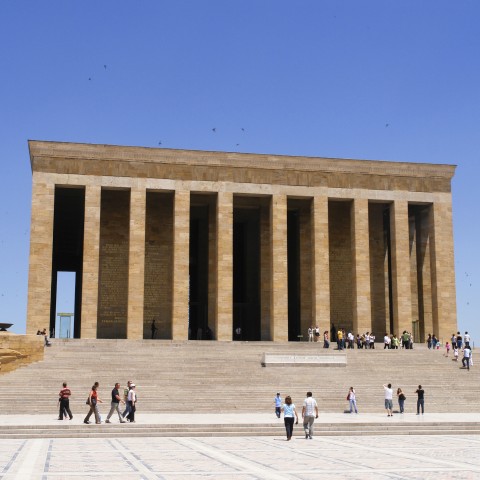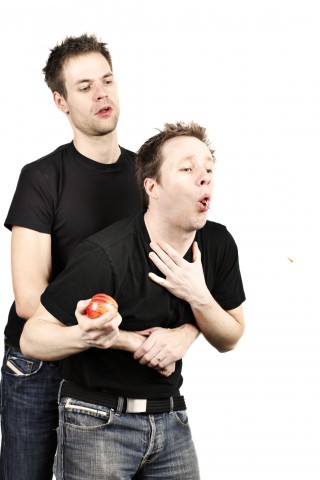
Flags and national anthems are the two most important tokens of the representation of national identities. However, since national anthems consist of lyrics and music, it’s a little more effective in getting the feelings across. The lyrics usually express a country’s power, independence, and patriotic sentiments, which touch people’s hearts deeply. Furthermore, with the help of music and the act of singing, the nation becomes as one heart, which beats as one together.
Every national anthem is unique and has its own story behind it. Would you like to know the history of the Turkish national anthem? What is the national anthem of Turkey called? How about learning the Turkish national anthem’s lyrics in English?
 Table of Contents
Table of Contents
- Vocabulary Relevant to National Anthems
- History of Turkish National Anthem – ‘İstiklal Marşı’
- Lyrics of İstiklal Marşı
- Where, When, and How is the Turkish National Anthem Sung?
- All about Turkish Language and Turkish Culture
1. Vocabulary Relevant to National Anthems
| Turkish | English |
| Milli | “National” |
| Marş | “March” |
| Bayrak | “Flag” |
| Saygı | “Respect” |
| Ceremony | “Tören” |
| Geçit töreni | “Parade” |
| Vatansever | “Patriot” |
| Vatanseverlik | “Patriotism” |
| Official | “Resmi” |
| Güfte/söz | “Lyrics” |
| Orkestrasyon | “Orchestration” |
| Beste | “Composition” |
2. History of Turkish National Anthem – ‘İstiklal Marşı’
1. Content and the origin of content
Turkish history goes back thousands of years, and the rule of theOttoman Empire is a significant period. Upon the defeat of the Ottoman Empire at the end of World War 1, some regions of the Ottoman Empire were occupied by other countries. In 1919, the War of Independence was started to ensure and protect the integrity of the country. This war ended successfully in 1923 and led to the establishment of the Republic of Turkey.
In 1921, it was announced in the nation that an original National March was going to be selected and awarded in a competition. The aim was to motivate the battling military forces and to encourage and honor the whole nation for an independent land at the end of the war.
724 poems took part in the competition. However, none of them were found to be suitable as a National March.
It was realized that Mehmet Akif Ersoy, who was a famous poet at that time, hadn’t participated in the competition. He hadn’t sent a poem because he disapproved of the fact that there was a monetary reward for the winner.
The National Parliament convinced him to write and present a poem and ignore the prize. Finally, he sent his poem, which consisted of 10 verses. He expressed his confidence in the courage and self-sacrifice of the Turkish soldiers and the Turkish nation’s commitment to independence, God, homeland, and religion in this poem. He was, basically, referring to the Turkish War of independence.
2. Adoption and the lyricist
Mehmet Akif Ersoy’s poem, which was titled İstiklal Marşı (“Independence March”), was adopted as the Turkish National Anthem on March 12th, 1921, before the establishment of the Turkish Republic.
Do you know what happened to the reward he was entitled to? It was donated to a foundation, which provided poor women and children with new skills so that they could find jobs and make some money.
3. Composer and Orchestrator
After the adoption of the lyrics, there was a Turkish national anthem composer competition for the musical composition of the poem. 24 composers participated in this competition. However, due to the war in the country, there was no time to evaluate the results. Therefore, the poem was sung differently in the country’s different regions.
In 1924, Ali Rıfat Çağatay’s composition was selected. His music was used until 1930. Then, the composition, prepared in 1922 by Osman Zeki Üngör, the conductor of the Presidential Symphony Orchestra, started being used. However, it’s claimed that this music was composed for some other lyrics, not for the İstiklal Marşı.Later on, it was orchestrated by Edgar Manas.

3. Lyrics of İstiklal Marşı
İstiklal Marşı consists of 10 verses. Only verses 1 and 2 are sung as the National Anthem!
Please note that the words “the star and the crescent,” which are mentioned a few times in the poem, represent the star and the crescent on the Turkish flag.

Below, you can find the Turkish national anthem in English. Please note that the Ministry of Foreign Affairs of Turkey has translated the first two verses below. The remaining 8 verses below have been translated by Assoc. Prof. Dr. Günil Özlem Ayaydın Cebe.
| 1 | Korkma, sönmez bu şafaklarda yüzen al sancak; Sönmeden yurdumun üstünde tüten en son ocak. O benim milletimin yıldızıdır, parlayacak; O benimdir, o benim milletimindir ancak. | Fear not, the crimson flag, waving in these dawns will never fade Before the last hearth that is burning in my nation vanishes. That is my nation’s star, it will shine; That is mine, it belongs solely to my nation. |
| 2 | Çatma, kurban olayım çehreni ey nazlı hilâl! Kahraman ırkıma bir gül… ne bu şiddet bu celâl? Sana olmaz dökülen kanlarımız sonra helâl, Hakkıdır, Hakk’a tapan, milletimin istiklâl. | Oh coy crescent, do not frown for I am ready to sacrifice myself for you! Please smile upon my heroic nation, why that anger, why that rage? If you frown, our blood shed for you will not be worthy. Freedom is the right of my nation who worships God and seeks what is right. |
| 3 | Ben ezelden beridir hür yaşadım, hür yaşarım. Hangi çılgın bana zincir vuracakmış? Şaşarım! Kükremiş sel gibiyim; bendimi çiğner, aşarım; Yırtarım dağları, enginlere sığmam, taşarım. | I have been free since eternity, and free shall I be. What fool dares to shackle me? I defy the temerity! I am like a roaring flood; I overflow trampling down my banks, I tear apart mountains, surge into depths, and surpass. |
| 4 | Garb’ın âfâkını sarmışsa çelik zırhlı duvar; Benim iman dolu göğsüm gibi serhaddim var. Ulusun, korkma! Nasıl böyle bir îmânı boğar, “Medeniyet!” dediğin tek dişi kalmış canavar? | Western horizons may be encircled by walls armored in steel But I have my chest brimful of faith as my homeland’s frontier. Let it howl, fear not! How can it smother such solid faith That single-fanged monster, “Civilization!” as you call it? |
| 5 | Arkadaş! Yurduma alçakları uğratma sakın; Siper et gövdeni, dursun bu hayâsızca akın. Doğacaktır sana va’dettiği günler Hakk’ın… Kim bilir, belki yarın… belki yarından da yakın. | My friend! Never ever let the dastards into my land! Render your body a shield; bring this heinous raid to an end. For soon shall break the blissful days God promised, for sure; Perhaps tomorrow, who knows, perhaps even sooner than that. |
| 6 | Bastığın yerleri “toprak!” diyerek geçme, tanı! Düşün altındaki binlerce kefensiz yatanı. Sen şehîd oğlusun, incitme, yazıktır atanı; Verme, dünyâları alsan da, bu cennet vatanı | Do not assume what you tread on is mere “earth”, recognize it! Think of the thousands, without shrouds, lying beneath. You’re the son of a martyr, take shame, hurt not your ancestor; Cede not this heavenly homeland, even if it’s the worlds you’re granted. |
| 7 | Kim bu cennet vatanın uğruna olmaz ki fedâ? Şühedâ fışkıracak, toprağı sıksan şühedâ! Cânı, cânânı, bütün varımı alsın da Hudâ, Etmesin tek vatanımdan beni dünyâda cüdâ | Who would not offer his life for this homeland of paradise? Martyrs would pour forth, all martyrs, should one simply clutch the earth! If God will, He may take my life, my beloved, and my wealth, But may He not, for the world, just deprive me of my homeland. |
| 8 | Ruhumun senden, İlâhî, şudur ancak emeli: Değmesin ma’bedimin göğsüne nâ-mahrem eli! Bu ezanlar-ki şehâdetleri dînin temeli Ebedî yurdumun üstünde benim inlemeli | The sole wish of my soul, oh glorious God, from You is that, No heathen would ever, on the bosom of my temple, lay hand! These calls to prayer, whose testimonies are the ground of religion, Should resound far and wide over my eternal homeland. |
| 9 | O zaman vecd ile bin secde eder –varsa- taşım; Her cerîhamdan, İlâhî, boşanıp kanlı yaşım, Fışkırır rûh-i mücerred gibi yerden na’şım; O zaman yükselerek Arş’a değer, belki başım. | Then, my tombstone, if any, prostrates in rapture a thousand-fold, Of my every wound, oh glorious God, tears of blood gush forth, And out spurts my corpse, in pure spirit, from the ground, Perhaps then, shall ascend and to the heavens touch my crown! |
| 10 | Dalgalan sen de şafaklar gibi ey şanlı hilâl; Olsun artık dökülen kanlarımın hepsi helâl. Ebediyen sana yok, ırkıma yok izmihlâl: Hakkıdır, hür yaşamış bayrağımın hürriyet; Hakkıdır, Hakk’a tapan milletimin istiklâl! | So ripple and wave, like dawning skies, oh glorious crescent, So that every drop of my blood finally be blessed and worthy! Neither you nor my race shall ever be annihilated, For my flag, who has lived ever freely, has the right to liberty; For my nation, who worships God, has the right to independence! |
4. Where, When, and How is the Turkish National Anthem Sung?
1. Occasions
There is more to know about the Turkish national anthem. Let’s see when and where it’s played and sung.
1. At the beginning of the ceremonies of the official holidays,
2. At the welcoming and farewell ceremonies of the presidents of other countries,
3. At the welcoming and farewell ceremonies of the high-ranking commanders,
4. At the flag hoisting and lowering ceremonies,
5. In the reception of foreign ambassadors and other diplomats,
6. At the beginning of the ceremonies held in military units, schools, and institutions,

7. In special ceremonies where the president of the Turkish Republic will be present,
8. At the start and end times of radio and television broadcasts,
9. At the beginning of the association board meetings,
10. At the flag ceremonies held in schools (Every Monday morning and Friday afternoons and on special days),
11. At the military oath of enlistments,
12. In the visits of the statesmen to Anıtkabir (Ataturk‘s monumental tomb) and in other cases Anıtkabir visits,

13. At medal ceremonies,
14. In international sports games,
15. In the farewell of martyrs,

16. At state ceremonies,
17. In sports games,
18. In oath ceremonies and other ceremonies of military schools, unions and institutions,
19. Before the ceremonies and meetings of various parties, associations and organizations, etc.
2. National Anthem Etiquette in Turkey
Every country has its own national anthem etiquette. Here is what you should and shouldn’t do when the Turkish anthem is played:
1. Everyone must stop.
2. Everyone must stand up.
3. Everyone must stand at attention. (Straight, with feet together and arms by the sides)
4. Civilians have to take their hats off.
5. No eating, no talking, and no moving around during the march.
6. It must be sung in a respectful way.
One more piece of extra information about the Turkish anthem:
The lyrics of the Turkish national anthem, the Turkish flag, and the picture of Ataturk, the founder of the Turkish Republic, are framed and hung on the walls of every classroom in Turkey.
5. All about Turkish Language and Turkish Culture
In this article, you found out the answer to the question: “What is the name of the national anthem of Turkey?” Then you learned other facts about the Turkish national anthem, such as the Turkish national anthem’s lyrics in English, the history of the Turkish national anthem, the Turkish national anthem’s composer, and the national anthem etiquette in Turkey, etc. However, there is a lot more to know about Turkish culture and the Turkish language.
Therefore, visit TurkishClass101, which has numerous audio recordings, tons of vocabulary lists, and free resources, including the dictionary you can refer to, to get a better grasp of the Turkish language and its culture.
Don’t forget that there is also MyTeacher, which is the premium service of TurkishClass101 that you can use to practice with a private teacher.
Do you know what is also good about it? You can download the app for free and use it wherever you are.
Last but not the least, please continue to provide us feedback about all the resources provided at TurkishClass101!
Over 50 Useful Classroom Phrases in Turkish

Are you a foreign student who is planning to study in Turkey or are you a teacher who will be teaching in Turkey? In both cases, you will need to learn Turkish classroom words and phrases Turkish native speakers use.
If you are a student, you need to know school related vocabulary such as supplies, equipment, subjects etc. Furthermore, you should be able to understand the instructions given by your teacher. There are quite a number of Turkish classroom phrases for students in this article, which will make your life easier.
Dear teachers, I got you covered as well. I also included classroom phrases for teachers in Turkish so that you can communicate with your students smoothly.
Now, 1, 2, 3, eyes on me everybody; we are starting!
 Table of Contents
Table of Contents
- School Related Vocabulary
- Teacher’s Phrases
- Student’s Phrases
- Tests/Quizzes/Exams
- Learn More with TurkishClass101!
1. School Related Vocabulary
Here is a huge list of school related vocabulary you can refer to.
1. General vocabulary
Let’s follow the “general to specific” structure and start with general vocabulary.
| Turkish | English |
| Devlet okulu | “Public school” |
| Özel okul | “Private school” |
| İlkokul | “Elementary school” |
| Ortaokul | “Middle school” |
| Lise | “High school” |
| Üniversite | “University” |
| Dönem | “Semester” |
| Sömestr tatili | “Semester break” |
| Ödev | “Homework” |
| Not | “Grade” |
| Karne | “Report card” |
2. School buildings and rooms
There will be times when you need to find your way around in your school. The following vocabulary will be very helpful at those times:
| Turkish | English |
| Ana bina | “Main building” |
| Sınıf | “Classroom” |
| Kantin | “Canteen” |
| Kafeterya | “Cafeteria” |
| Kütüphane | “Library”; |
| Amfi | “Amphitheater” |
| Müzik odası | “Music room” |
| Öğretmenler odası | “Teachers’ room” |
| Sekreterlik | “Secretariat” |
3. Classroom equipment
Every classroom has some equipment used by students and teachers. Let’s see what they are called in Turkish.
| Turkish | English |
| Tahta | “Blackboard” |
| Akıllı tahta | “Smart board” |
| Tahta silgisi | “Blackboard eraser” |
| Tebeşir | “Chalk” |
| Tahta kalemi | “Board marker” |
| Bilgisayar | “Computer” |
| Projektör | “Projector” |
4. School supplies
Can you imagine that you forgot one of your school supplies at home and wanted to borrow it from a friend and you don’t know what it is called in Turkish? There is always a solution; maybe you can show it to your friend, so he/she would understand what you want. However, is this an efficient communication? Of course not. Why should you struggle? Just note the following list:
| Turkish | English |
| Okul çantası | “School bag” |
| Defter | “Notebook” |
| Kitap | “Book” |
| Kurşun kalem | “Pencil” |
| Tükenmez kalem | “Pen” |
| Silgi | “Eraser” |
| Kalemtıraş | “Pencil sharpener” |
| Kalem kutusu | “Pencil case” |
| Tablet | “Tablet” |

5. List of school subjects
Here comes Turkish to English translations of some vocabulary related to school subjects, which is important for both students and teachers:
| Turkish | English |
| Türkçe | “Turkish” |
| Türk dili ve edebiyatı | “Turkish Language and Literature” |
| İngilizce | “English” |
| Matematik | “Math” |
| Geometri | “Geometry” |
| Coğrafya | “Geography” |
| Tarih | “History” |
| Biyoloji | “Biology” |
| Kimya | “Chemistry” |
| Fizik | “Physics” |
| Müzik | “Music” |
| Resim | “Art” |
| Beden Eğitimi | “Physical Education” |
| Ekonomi | “Economics” |
| Felsefe | “Philosophy” |
2. Teacher’s Phrases
Our beloved teachers here comes your part where I will cover some classroom phrases for teachers in Turkish.
1. Greetings
Let’s begin with basic Turkish classroom greetings . Turkish native speakers use
| Turkish | English |
| Günaydın çocuklar/gençler | “Good morning children/youth” |
| Tünaydın | “Good afternoon” |
| İyi günler | “Good day” |
| Kendinize iyi bakın | “Take care of yourselves” |
| İyi dersler | “Enjoy your classes” |
2. Instructions
If you are looking for the answer to the question “How should a teacher give instructions in Turkish?” go ahead and check the basic Turkish phrases below:
| Turkish | English |
| Dikkatli dinleyin. | “Listen carefully.” |
| Tahtaya bakın lütfen. | “Look at the board, please.” |
| Hep beraber tekrar edelim. | “Let’s repeat together.” |
| Sorunuz varsa elinizi kaldırın. | “Raise your hand if you have a question.” |
| Sayfa 5’i açın. | “Open page 5.” |
| 3’lü gruplar oluşturun. | “Form groups of 3.” |
3. Questions
Teachers use questions as a teaching tool; sometimes they are used to find out what students have learnt or haven’t learnt and at times, they are used to make students participate. Let’s take a look at some questions teachers can use in a classroom where Turkish is spoken.
| Turkish | English |
| Bugün herkes burada mı? | “Is everybody here today?” |
| Herkes ödevini yaptı mı? | “Has everyone done their homework?” |
| Buraya kadar anladınız mı? | “Did you understand up to here?” |
| Kim cevap vermek ister? | “Who wants to answer?” |
| Bu konuyu kim anlatmak ister? | “Who wants to explain this topic?” |
| Kim okumak ister? | “Who wants to read?” |
| Herhangi bir sorunuz var mı? | “Do you have any questions?” |
| Sıra kimde? | “Who is next?” |
| Herkes bitirdi mi? | “Has everyone finished?” |
4. Discipline
When you are dealing with kids, sometimes things may go out of control. At that point, teachers have to use certain phrases to maintain discipline in the classroom. Make sure to note the following basic Turkish phrases; one day you might need them.
| Turkish | English |
| Oturun! | “Take a seat!” |
| Susun! | “Quit talking!” |
| Sessiz olun! | “Be quiet!” |
| Sorunuz varsa, elinizi kaldırın. | “Please raise your hand if you have a question.” |
| Cevabı biliyorsanız elinizi kaldırın. | “Raise your hand if you know the answer.” |

5. Praise and motivation
I believe the power of praise and motivation is unquestionable in education. Therefore, the Turkish classroom phrases below, will be another strong tool for teachers.
| Turkish | English |
| Aferin! | “Good job!” |
| Tebrikler! | “Congratulations!” |
| Aferin, böyle devam et. | “Keep up the good work.” |
| Tam isabet! | “Right on!” |
| İngilizceniz çok gelişti. | “Your English has improved a lot.” |

3. Student’s Phrases
Dear students, here are some Turkish classroom phrases for students you can use in different cases.
1. Greetings
Here are a few Turkish classroom greetings for students they can use to greet their teacher:
| Turkish | English |
| Günaydın hocam/öğretmenim | “Good morning teacher” |
| Tünaydın hocam | “Good afternoon teacher” |
| Hoşçakalın | “Good-bye” |
2. Concerns and questions
Are you wondering how you can address your concerns with your teacher in Turkish? Also, would you like to know how you can ask your questions in Turkish? Here comes a little help for you:
| Turkish | English |
| Anlamadım. | “I didn’t understand.” |
| Bunu tekrar edebilir misiniz lütfen? | “Can you repeat that please?” |
| Biraz daha yavaş anlatabilir misiniz? | Can you explain a little slower?” |
| Hangi sayfadayız? | “Which page are we on?” |
| Bir kere daha anlatabilir misiniz? | “Can you explain it one more time?” |
| Bana hiç anlamlı gelmiyor. | “It doesn’t make any sense to me?” |
| Bu doğru mu? | “Is this correct?” |
| Bana yardım edebilir misiniz? | “Can you help me?”; |
| Bir soru sorabilir miyim? | “May I ask a question?” |
| ‘xxx’ ne demek? | “What does ‘xxx’ mean?” |

3. Talking about problems
Problems are everywhere, even in classrooms. Following basic Turkish phrases will help you to talk about your problems:
| Turkish | English |
| Kendimi iyi hissetmiyorum, dışarı çıkabilir miyim? | “I am not feeling well, may I go out?” |
| Kitabımı kaybettim. | “I lost my book.” |
| Kitabımı evde unuttum. | “I forgot my book at home.” |
| Ödevimi yapamadım. | “I couldn’t do my homework.” |
| Tuvalete gidebilir miyim? | “Can I go to the restroom?” |
| Geç kaldığım için özür dilerim. | “I apologize for being late.” |
| Daha fazla süreye ihtiyacım var. | “I need more time.” |
| Alıştırmaları bitiremedim. | “I couldn’t complete the exercises.” |
| Yarın okula gelemeyeceğim. | “I won’t be able to come to school tomorrow.” |
4. Talking about school subjects
If you are a student, talking about school subjects is inevitable. Here is how you can do it in Turkish:
| Turkish | English |
| En sevdiğim ders ‘xxxx’. | “My favorite subject is ‘xxxx.” |
| Matematikte hiç iyi değilim. | “I am not good at Math, at all.” |
| Tarih dersini hiç sevmiyorum. | “I don’t like history class, at all.” |
4. Tests/Quizzes/Exams
Exams are parts of the education system, but also, they are the nightmares of most students. Let’s take a look at some Turkish classroom phrases for students related to exams.

1. Basic vocabulary
Here is Turkish to English translations of some vocabulary related with tests and exams you can refer to:
| Turkish | English |
| Test | “Test” |
| Sınav | “Exam” |
| Quiz | “Quiz” |
| Sınava girmek | “To take an exam” |
| Sınavı geçmek | “To pass the exam” |
| Sınavdan kalmak | “To fail an exam” |
2. Instructions
Reading the instructions in an exam can be as important as studying for the exam. You might know the answer, but if you don’t do exactly what the instructions tell you to do, you might fail your exam. Therefore, I strongly suggest that you pay attention to the following test instructions in Turkish.
| Turkish | English |
| Metni okuyun. | “Read the text.” |
| Boşlukları doldurun. | “Fill in the blanks” |
| Bu cümleleri tamamlayın. | “Complete these sentences.” |
| Doğru seçeneği işaretleyin. | “Mark the correct option.” |
5. Learn More with TurkishClass101!
In this article, you learned quite a number of Turkish classroom phrases for students and classroom phrases for teachers in Turkish. However, there are a lot more useful classroom phrases in Turkish!
Therefore, visit TurkishClass101, which has numerous audio recordings, tons of vocabulary lists and free resources including the dictionary you can refer to, in order to learn Turkish language faster or to improve your Turkish language learning.
Don’t forget that there is also MyTeacher, which is the premium service of TurkishClass101 that you can use to practice with a private teacher.
Do you know what is also good about it? You can download the app for free and use it wherever you are.
Last but not the least; please continue to provide us feedback about all the resources provided at TurkishClass101!

Your Guide for Dining Out: Turkish Restaurant Phrases

Turkish cuisine has a good reputation amongst the different cuisines in the world. Its variety and deliciousness are very well known.
If you are reading this article, you may either be visiting Turkey for some reason or possibly you are interested in the different flavors of Turkish cuisine.
If you don’t speak the language, I can imagine what crosses your mind:
“I don’t know how to order food in Turkish; I should learn Turkish restaurant vocabulary/phrases; How do I call a waiter/waitress in Turkey? How much tip should I leave?”
You don’t need to get stressed because we will cover common Turkish restaurant phrases as well as the relevant traditional facts in this article.
All you need to do is to note all the information below and dream of enjoying every bit of the amazing Turkish food.

 Table of Contents
Table of Contents
- Dining Vocabulary
- Making a Reservation at a Restaurant
- Conversations During Dining
- Ordering food and beverages
- After Dining
- Compliments and Complaints
- All About Turkish
1. Dining Vocabulary
Before going into Turkish restaurant phrases, you should learn some dining vocabulary such as utensil names, food, beverages, tastes, etc. in Turkish. Let’s start with utensils.
1. Utensils
Below are the names of utensils in Turkish. If you want another plate or if you drop your fork, with the help of this vocabulary, you will be able to ask for another one.
| Turkish | English |
| Tabak | “Plate” |
| Kâse | “Bowl” |
| Bardak | “Glass” |
| Çatal | “Fork” |
| Bıçak | “Knife” |
| Kaşık | “Spoon” |
2. Food
The following vocabulary will make your life easier when you are ordering your food:
| Turkish | English |
| Tavuk | “Chicken” |
| Balık | “Fish” |
| Et | “Meat” |
| Salata | “Salad” |
| Ekmek | “Bread” |
| Çorba | “Soup” |
| Tatlı | “Dessert” |
| Dondurma | “Ice cream” |
3. Beverages
We got you covered for beverages as well.
| Turkish | English |
| Su | “Water” |
| Soda | “Sparkling water” |
| Bira | “Beer” |
| Şarap | “Wine” |
| Çay | “Tea” |
| Kahve | “Coffee” |
4. Tastes
As I mentioned above, Turkish cuisine is very rich and has many different varieties. Every region has its own unique tastes. Some regions are known for their very spicy foods. We suggest you take a close look at the following vocabulary to make sure the food you eat is not only pleasing to your eyes but also your mouth.
| Turkish | English |
| Tatlı | “Sweet |
| Acı | “Bitter” |
| Ekşi | “Sour” |
| Tuzlu | “Salty” |
| Baharatlı | “Spicy” Other |
5. Other
Here are some other restaurant-related words you might need:
| Turkish | English |
| Restoran | “Restaurant” |
| Masa | “Table” |
| Rezervasyon | “Reservation” |
| Menü | “Menu” |
| Peçete | “Napkin” |
| Bahşiş | “Tip” |
2. Making a Reservation at a Restaurant
In Turkey, you usually don’t need to make a reservation in a small or a mid-size restaurant. You might wait for a short time if there is no availability because the “first come, first served” principle will work. However, if you are celebrating a special occasion, if you are a large group of friends, if you are having a business dinner, or if you have special guests, then you shouldn’t take a risk, and you must make a reservation in advance.
Also, breakfast/brunch places are usually packed on the weekends. It might be a good idea to make a reservation in advance not to wait too long.
Furthermore, on special days like Valentine’s Day and New Year’s Eve, restaurants get booked way in advance, so try to get a reservation a month prior; do not wait until the last minute to make one; you won’t have any luck!
On the other hand, almost all luxurious restaurants and prestigious bars with live music require a reservation.
1. Reservation on the phone
If you are making a reservation on the phone, the following Turkish restaurant dialogue will help you tremendously:
Restaurant:
İyi günler. “Şamdan” restoran, nasıl yardımcı olabilirim? – “Good day. “Şamdan” restaurant, how may I help you?”
Customer:
İyi günler. 28 Temmuz Salı akşamı için iki kişilik rezervasyon yaptırmak istiyorum? – “Good day. I’d like to make a reservation for two on Tuesday, July 28th.”
Restaurant:
Tabi, hemen kontrol ediyorum. Saat kaç için rezervasyon yaptırmak istiyorsunuz? – “Sure, I’m checking right away. What time would you like to make a reservation?
Customer:
Akşam saat sekiz için lütfen. Bir de deniz kenarındaki masalardan biri olursa çok iyi olur. – “For eight o’clock in the evening, please. Also, it would be great if it could be one of the tables by the sea.”
Restaurant:
Tamam. 28 Temmuz Salı akşamı sekiz için iki kişi için deniz kenarında rezervasyonunuzu yaptım. Rezervasyonunuzu o akşam 8:15’e kadar tutabiliriz. Başka bir arzunuz var mı? – “Okay. I made a reservation for two people on Tuesday evening, July the 28th at 8 o’clock. We can hold your reservation until 8:15 p.m. that evening. Do you have any other requests?”
Customer:
Teşekkürler, hoşçakalın. – “Thanks. Good-bye.”
Restaurant:
Hoşçakalın – “Good-bye”
2. At the restaurant
If you are at the restaurant and trying to get a table or informing them about an existing reservation, the following phrases will be life savers for you:
– Brad James adına rezervasyonumuz vardı. – “We had a reservation under the name of Brad James.”
– 4 kişilik bir masa istiyoruz lütfen. – “We’d like a table for 4, please.”
– Nerede oturmak istersiniz? – “Where would you like to sit?”
– Sigarasız bölümde oturmak istiyoruz. – “We’d like to sit in the non-smoking section.”
– Bahçede yeriniz var mı? – “Do you have a table in the garden?”
– Ne kadar beklememiz gerekir? – “How long do we have to wait?”
3. Conversations During Dining
If you finally manage to get a table, you can take a deep breath and get ready for the next step!
1. Getting the waiter’s attention
Displaying a menu outside of the restaurant is not that common in Turkey. This is more common in tourist destinations. These days even though many cafes use QR code menus, which are accessible via smartphones by scanning a QR code, most restaurants still offer traditional printed menus. Therefore, you might still need the help of a waiter/waitress.
Here are a few ways you can call a waiter/waitress.
– Pardon, bakar mısınız? – “Excuse me.”
– Pardon, sipariş verebilir miyiz? – “Excuse me, can we order?”
2. All about the menu
Below are some common Turkish restaurant phrases you can use to get a menu and information about the food on the menu:
– Menüyü görebilir miyiz? – “Can we see the menu?”
– Şarap menüsünü alabilir miyiz lütfen? – “Could we have the wine menu please?”
– Tatlı menüsünü getirebilir misiniz lütfen? – “Could you bring the dessert menu please?”
– Ne tavsiye edersiniz? – “What would you recommend?”
– Bugünün spesiyalleri neler? – “What are today’s specials?”
– Günün çorbası nedir? – “What’s the soup of the day?”
– Menüde yöresel bir yemek var mı? – “Is there a regional dish on the menu?”
4. Ordering food and beverages
Here comes the most exciting part: ordering food and beverages.
1. Food
Your waiter/waitress will probably ask the following questions to get your order:
– Sipariş vermek için hazır mısınız? – “Are you ready to order?”
– Siparişinizi alabilir miyim? – “Can I have your order?”
– Ne yemek istersiniz? – “What would you like to eat?”

You can order your food with the following Turkish restaurant phrases:
– Ben sadece salata istiyorum. – “I just want a salad.”
– Çok pişmiş bonfile istiyorum ama yanında kızarmış patates istemiyorum. – “I’d like well-done steak, but I don’t want fried potatoes on the side.”
– Benim çileğe karşı alerjim var. Bu tatlıda çilek var mı? – “I’m allergic to strawberries. Are there any strawberries in this dessert?”
2. Beverages
Here is a Turkish restaurant dialogue for ordering beverages:
Waiter/waitress: Ne içmek istersiniz? – “What would you like to drink?”
Customer: – Sadece su alayım. – “Let me just get water.”
– Bir kadeh kırmızı şarap rica edeyim. – “I’d like a glass of red wine, please.”
– Çocuklar için portakal suyu lütfen. – “Orange juice for the children, please.”

3. Requesting additional sauces/ingredients and utensils
Let’s take a look at other basic Turkish phrases restaurant customers can refer to:
– Birkaç tane daha peçete alabilir miyim? – “Can I have a few more napkins?”
– Çatalımı düşürdüm. Bir tane daha alabilir miyim? – “I dropped my fork. Can I have another one?”
– Ketçap ve mayonez de getirebilir misiniz? – “Can you also bring ketchup and mayonnaise?”
– Kahve için biraz daha süt alabilir miyiz lütfen? – “Can we have some more milk for the coffee please?”
4. Providing feedback
Would you like to know how you can give feedback while you are still at the table? Here you go:
– Bu bardak kirli; değiştirebilir misiniz? – “This glass is dirty; can you change it?”
– Çorba çok tuzluydu. – “The soup was too salty.”
– Yemek çok lezzetliydi. – “Food was very delicious.”
– Ben bunu sipariş etmedim. – “I didn’t order this.”
– Biz bundan 3 tane sipariş ettik; iki değil. – “We ordered three of these, not two.”

5. Other information
– Pardon, sigara içilen kısım nerede? – “Sorry, where is the smoking area?”
– Pardon. tuvalet nerede acaba? – “Excuse me, where is the restroom?”
5. After Dining
Your meal is over, and I am sure you still have some questions. “Is it okay to ask for a doggy bag? How can I pay? How much of a tip do I need to give?”
In Turkey, it has recently started getting popular to ask for a doggy bag. However, it’s still not acceptable to ask for a box if you are at a luxurious restaurant.
As for tipping, in Turkey, there is nothing set in stone for the percentage. You can leave as much as you want. Giving around 10% of the bill as a tip has recently become popular.

Furthermore, tipping with a credit card is still not a common behavior in Turkey.
Note the following phrases:
– Kalanı paket yapabilir misiniz? – “Can you put the rest in a box?”
– Hesap lütfen. – “Bill, please.”
– Hesabı alabilir miyiz lütfen? – Could we get the bill, please?
– Ayrı ayrı ödeyebilir miyiz? – “Can we pay separately?”
– Kredi kartı kabul ediyor musunuz? – “Do you accept credit cards?”
– Üstü kalsın. – “Keep the change.”
– Kasada ödeyebilir miyiz? – “Can we pay at the register?”
– Bahşiş kutusu var mı? – “Is there a tip box?”
6. Compliments and Complaints
We hope you had an enjoyable and unforgettable dining experience. If that is the case, you can show your appreciation not only with a big tip but also with a sincere compliment. How? Here you go:
– Her şey çok güzeldi, teşekkürler. – “Everything was great, thank you.”
– Hızlı ve iyi servis için teşekkürler. – “Thanks for the fast and good service.”
– Yemekler harikaydı, çok beğendik. – “The food was great, we loved it.”
– Şefe teşekkürlerimizi iletin. – “Give our thanks to the chef.”
We hope not, but if you had a bad experience, that also has to be shared with a positive attitude. Here is how you can tell your dissatisfaction:
– Servisten hiç memnun kalmadık. Müdürle konuşmak istiyorum. – “We were not satisfied with the service at all. I’d like to speak with the manager.”
– Yemeklerden hiç memnun kalmadık. Müdürle konuşmak istiyorum. – “We were not satisfied with the food at all. I’d like to speak with the manager.”
7. All About Turkish
In this article, you learned some Turkish restaurant vocabulary/phrases and how to order food in Turkish. However, there is a lot more to know!
Therefore, visit TurkishClass101, which has numerous audio recordings, tons of vocabulary lists, and free resources including the dictionary you can refer to, in order to get a better grasp of the Turkish language and the culture.
Don’t forget that there is also MyTeacher, which is the premium service of TurkishClass101 that you can use to practice with a private teacher.
Do you know what is also good about it? You can download the app for free and use it wherever you are.
Last but not the least; please continue to provide us feedback about all the resources provided at TurkishClass101!

Basic Turkish Conversation Starters Guide

It’s usually difficult to start a conversation no matter where you are and whom you are talking to. If you are speaking to someone you don’t know, this gets even more complicated. One step beyond that is starting a new conversation in a foreign language. Can you imagine trying to start a conversation with a stranger in another language? You might feel like you are at a dead end! Trust me; it’s not as scary as you might think, especially if you get certain tips from a native speaker.
I’m here to provide you with some examples of basic Turkish conversation starters you can use in different situations, as the sentences and questions you will use to start a conversation will differ depending on whether you are talking to someone you know or don’t know or where the conversation takes place.
Once you pull the other party into the conversation or find a common interest, then you can take the communication one step further; you get to know the other party more, socialize more, and deepen your relationships.
Afterward, you can start telling an anecdote or talking about memories, good or bad experiences, and making recommendations and compliments.
However, there are a few factors you need to take into consideration when using conversation starters. The first and the most important one is to avoid sensitive topics such as religion, race, and politics, especially when interacting with people you don’t know. Make sure not to offend anybody. The second one is to avoid “yes” and “no” questions as much as possible. If the person you are talking to is shy or not talkative, the conversation might end suddenly, and all your efforts might come to nothing. Last but not least, make sure to use your body language correctly. Don’t forget that body language is a strong tool to express or emphasize your feelings. A friendly smile might change everything.
[There is an article about “Body gestures”, which has not been posted yet at TurkishClas101. It can be referenced when it’s posted.]
 Table of Contents
Table of Contents
- Starting a Conversation with New People
- Starting a Conversation with People We Know
- Conversation Starters for a First Date
- Conversation Starters to Reconnect with a Friend through Text or Email
- Turkish Conversation Starter Practice with TurkishClass101!
1. Starting a Conversation with New People
I believe the best way to interact with people you don’t know is to ask for information or help. Let’s learn conversation starters in Turkish that you can use when you meet Turkish speaking people in different environments.
A- Conversation Starters at a New School
The first days at a new school are usually tough and stressful if you don’t know anyone around you. You need to relax because most probably you are not alone!
Actually, all you need to do is to pluck up the courage and set your eyes on someone who looks friendly and try to start a conversation by using the following Turkish conversation starter examples:
| Turkish | English |
| Merhaba. Benim adım John. Ben okula yeni başladım. Senin adın ne? | Hello. My name is John. I’ve just started school. What’s your name? |
| Bu sandalye boş mu? Oturabilir miyim? (*) | Is this chair available? May I sit? |
| Kaçıncı sınıfa gidiyorsun? | Which grade are you going to? |
| Affedersiniz, okulda yeniyim. Kütüphane nerede? | Excuse me, I’m new at school. Where is the library? |
(*): This is a yes/no question, but once you get the answer “yes” and sit next to the person you want to talk to, you will have a chance to make a friend.

B- Conversation Starters at a New Job
Business settings are more formal; therefore, people might feel tense during their first days at work. If you are a foreigner, you might be over cautious not to make a mistake and a bad first impression. However, working towards the same vision and mission might make the situation a little easier.
It might be a good idea to learn about Turkish business etiquette in advance to feel more comfortable in your professional relationships with others.
The weather and traffic are popular ice-breakers in Turkish. However, the following basic Turkish phrases will also give you more ideas to make small talk at work:
| Turkish | English |
| Merhaba. Benim adım Mary. Bugün benim ilk iş günüm. Sizin adınız ne? | Hello. My name is Mary. Today is my first day at work. What’s your name? |
| Hangi departmanda çalışıyorsunuz? | Which department are you working at? |
| Ne kadar zamandır burada çalışıyorsunuz? | How long have you been working here? |
| Affedersiniz, ben yeniyim. Kayboldum. Kafeteryanın yerini tarif edebilir misiniz? | Excuse me, I’m new. I’m lost. Can you please tell me where the cafeteria is? |

C- Conversation Starters for Mingling and Socializing
If you are at a social gathering, you should have fun and enjoy every moment you are there. Don’t make a fuss about meeting new people. Take it easy, you can make small talk about simple things. Nobody is expecting you to talk about nuclear weapons, genetics, or any other serious topics. Don’t forget that others are also there to have a good time and relax!

Below are some questions on how to start a conversation in Turkish that you can use when you want to socialize:
| Turkish | English |
| Ev sahibini nereden tanıyorsunuz? | How do you know the host? |
| Yediğiniz/içtiğiniz şey nedir? Güzel görünüyor | What is it that you are eating/drinking? That looks good. |
| Çok trafik vardı. Buraya kolay gelebildiniz mi? | There was a lot of traffic. Did you get here easily? |
| Ben biraz yiyecek alacağım. Bir şeye ihtiyacınız var mı? | I’m going to get some food. Do you need anything? |
2. Starting a Conversation with People We Know
It’s easier to start a conversation with the people you know because at least you have a clue about who they are or what they do.
A- Conversation Starters at School
You can talk about school, classes, or just chit-chat if you already know the person you are talking to. Here are some ideas for you:
| Turkish | English |
| Şimdi hangi dersin var? | Which lesson do you have now? |
| Sabah hava çok yağmurlu idi. Buraya iki saatte ancak gelebildim. Senin buraya gelmen ne kadar sürdü? | It was very rainy in the morning. I was able to get here in two hours. How long did it take for you to get here? |
| Öğle yemeğinde sana katılabilir miyim? | May I join you for lunch? |
B- Conversation Starters at Work
Starting a conversation with a colleague you know requires less effort. The topics you talk about will depend on how close you are, or if you want to be with this person. If you are distant from him/her, you can pick work-related subjects. If you are closer or want to be closer, you can talk about things other than work. Below are some Turkish conversation starter examples:
| Turkish | English |
| Proje için yardıma ihtiyacın var mı? | Do you need help with the project? |
| İş çıkışı bir şeyler yapalım mı? | Shall we do something after work? |
| Haftasonu ne yaptın? | What did you do on the weekend? |
| Öğle yemeğini genellikle nerede yiyorsun? | Where do you usually have your lunch? |
C- Conversation Starters for Mingling and Socializing
Mingling and socializing with the people you know should be a good opportunity to get to know them better. The following questions might give you an idea of what to ask.
| Turkish | English |
| Yaz tatilinde nereye gittin? | Where did you go on summer vacation? |
| Son görüşmemizden bu yana neler yaptın? | What have you done since the last time we had met? |
| Yeni işin nasıl gidiyor? | How’s your new job going? |
3. Conversation Starters for a First Date
Are you going on a date with someone for the first time? How exciting! This is a great opportunity for you to get to know them, their lifestyle, likes, dislikes, hobbies, etc. However, you should stay calm and try to be natural. You know, however, that there is a possibility of not knowing what to say next!
You can start by complimenting his/her appearance. Don’t forget that you are walking a fine line between sincerity and being disingenuous. Don’t give fake compliments, and don’t exaggerate! Remember the fact that the tone, mimics, and gestures you use when complimenting really matter!
You might want to take a look at our Turkish compliments article.

Here are some compliments and basic Turkish conversation starters you can use on your first date:
| Turkish | English |
| Çok güzel görünüyorsun. | You look very beautiful. |
| Çok şıksın. | You are very chic. |
| Nerede büyüdün? | Where did you grow up? |
| En sevdiğin renk/film/yemek ne? | What’s your favorite color/movie/food? |
| En sevdiğin şarkıcı/aktör/aktris kim? | Who’s your favorite singer/actor/actress? |
| Boş zamanlarında ne yaparsın? | What do you do in your spare time? |
You can go into more personal questions if you think you are a good match with him/her.
Bookmark this link for Turkish love phrases. Who knows, maybe you will need it after your first date!
4. Conversation Starters to Reconnect with a Friend through Text or Email
It’s always good to reconnect with an old friend. As long as you are direct and show a willingness to catch up, you can start where you left off. Try some of these sincere phrases:
| Turkish | English |
| Epeydir görüşemedik. Haftasonu buluşalım mı? | We haven’t seen each other for a long time. Shall we meet at the weekend? |
| Görüşmeyeli neler oldu neler. En kısa zamanda görüşelim. | A lot of things have happened during the time we have not seen each other. Let’s meet as soon as possible. |
| Seni çok özledim. Bir an önce buluşalım artık. | I missed you very much. Let’s meet soon. |
| Sana mutlaka anlatmam gereken bir şey var. Yarın buluşalım mı? | There’s something I must tell you. Shall we meet tomorrow? |

5. Turkish Conversation Starter Practice with TurkishClass101!
Dear Turkish language learners, you have learned the basic Turkish conversation starters, and you now know how to start a conversation in Turkish. From now on, it will be easier for you to meet Turkish native speakers and keep your conversations going with your friends, colleagues, etc.
If you need more Turkish conversation starter examples and want to improve your Turkish language learning skills, then you should visit TurkishClass101, which has numerous audio recordings, tons of vocabulary lists, and free resources, including the dictionary you can refer to.
Don’t forget that there is also MyTeacher, which is the premium service of TurkishClass101 that you can use to practice with a private teacher.
Do you know what is also good about it? You can download the app for free and use it wherever you are.
Last but not the least, please continue to provide us feedback about all the resources we have to offer you at TurkishClass101!

Sound Like a Native with Advanced Turkish Phrases

Turkish learners who have completed the intermediate level, may I have your attention please? You have accomplished quite a bit by finishing this level—congratulations! But are you ready to step up and take your language skills to the next level? If so, then learning advanced Turkish expressions and phrases will be a great way to start adding flavor to your speech and writing. In this article, you’ll have the opportunity to learn over 40 advanced Turkish expressions and phrases, including idioms and proverbs.
This article will not only help you to communicate effectively with native speakers in your daily life but also help you to boost your level of communication at work or in other business relationships. Furthermore, it will be helpful in the academic arena if you are working in the academic industry or attending a school in Turkey.
 Table of Contents
Table of Contents
- Make Your Academic Writing Shine
- Stand out with Your Resume and Cover Letter
- Impress Your Colleagues at Business Meetings
- Get Ahead with Advanced Idioms, Sayings and Proverbs
- Set the Bar High with TurkishClass101
1. Make Your Academic Writing Shine
Academic writing requires certain technicality and formality you need to adhere to even if you are writing in your own native language. Articulating your ideas powerfully is critical in writing essays, so make sure to use the following advanced Turkish words and phrases if you want your academic writing in Turkish to shine.

Introduction
If you can capture the attention of the readers right at the very beginning, your article will not get lost in the shuffle.
Consider using the Turkish advanced expression and phrases below to get the attention your article deserves:
| İlk olarak | İlk olarak tezimin amacını belirtmek isterim. |
| First of all | First of all, I would like to state the purpose of my thesis. |
| Genel olarak | Genel olarak bu kavram dünyanın birçok ülkesinde kabul görmüştür. |
| In general | In general, this concept has been accepted in many countries around the world. |
Body
Pay attention to your flow after the introduction and make sure to maintain the integrity. Make sure that your arguments, examples, comparisons, etc. are clearly expressed. The following advanced Turkish phrases will help you to stay on track.
| Bence | Bence bu örnek savımın doğruluğunu kanıtlıyor. |
| In my opinion | In my opinion, this example proves the correctness of my argument. |
| Benim bakış açıma göre | Benim bakış açıma göre, bu veriler sonucu değiştirmez. |
| From my point of view | From my point of view, these data do not change the result. |
| Buna ilaveten | Buna ilaveten, yaptığım başka bir araştırmayı da paylaşmak istiyorum. |
| In addition to this | In addition to this, I would like to share another research study that I have done. |
| Diğer bir deyişle | Diğer bir deyişle, teori ile Pratik farklıdır. |
| In other words | In other words, theory and practice are different. |
| Tahmin edildiği üzere | Tahmin edildiği üzere, bu deney sadece 20-30 yaş aralığı üzerinde yapılmıştır. |
| As projected | As projected, this experiment was only performed on the 20–30 age range. |
Conclusion
Wrapping up your ideas and arguments effectively will help the readers to understand your final statement easily. Therefore, use the following advanced Turkish phrases to make sure to get your ideas across.
| Özetlemek gerekirse | Özetlemek gerekirse, yukarıda belirtilen tüm faktörler hipotezimin doğruluğunu desteklemektedir. |
| To sum up | To sum up, all the factors mentioned above support the correctness of my hypothesis. |
| Sonuç olarak | Sonuç olarak, genç nüfus listelenen tüm koşulları kabullenmektedir. |
| As a result | As a result, the young population accepts all the conditions that are listed. |
2. Stand out with Your Resume and Cover Letter
You might be very talented, experienced, and a perfect fit for the job you are applying for. However, if you do not reflect all of these on your resume or if you don’t use the right keywords on your cover letter, guess what, someone else gets the job! This is not the case when you apply for a job in a foreign language; you can face the same problem even in your own native language.

Therefore, it might be a good idea to note the following advanced Turkish words and phrases you can use when writing your resume and a cover letter for a job you are interested in.
| Hedef odaklı | 5 yıllık tecrübeye sahip, hedef odaklı bir mühendisim. |
| Goal-driven | I am a goal-driven engineer with 5 years of experience. |
| Sonuç odaklı | Sonuç odaklı bir yöneticiyim. |
| Result oriented | I am a result oriented manager. |
| Detaylara önem veren | Detaylara önem veren ama bütünü de görebilen biriyim. |
| Detail oriented | I am detail oriented but can also see the whole picture. |
| Hedeflere ulaşmak | Hedeflerime ulaşmak her zaman benim için öncelikli olmuştur. |
| To reach goals | Reaching my goals has always been a priority for me. |
| Yönetim tecrübesi | Yönetim tecrübem de var. |
| Management experience | I also have management experience. |
| En yüksek standartları karşılamak | Her zaman en yüksek standartları karşılamak için elimden gelenin en iyisini yaparım. |
| To meet the highest standards | I always do my best to meet the highest standards. |
| İletişim becerileri | İletişim becerilerimi geliştirmek için xxxx seminerine katıldım. |
| Communication skills | I attended the xxxx seminar to improve my communication skills. |
3. Impress Your Colleagues at Business Meetings
Business meetings are different from social gatherings. You must look confident not only with your posture and attitude but also with your words; you must build up trust and sound like you know what you are talking about.

The following advanced Turkish words and phrases will help you to be more confident in business meetings held in Turkish and you will be able to impress your Turkish colleagues:
| Bugünkü toplantının gündemi | Bugünkü toplantının gündemi, projenin bütçesinin revizyonu ile ilgilidir. |
| The agenda of today’s meeting | The agenda of today’s meeting concerns the revision of the project’s budget. |
| Son teslim tarihi | Projenin son teslim tarihinin 1 Eylül olduğunu hatırlatmak isterim. |
| Deadline | I would like to remind you that the deadline of the project is September 1st. |
| Bir strateji belirlemek | Satışları arttırmak için bir strateji belirlemek gerekir. |
| To set/determine a strategy | It is necessary to determine a strategy to increase sales. |
| Yol haritası çıkarmak | Yol haritamızı çıkarmalıyız. |
| To make a roadmap | We have to make our roadmap. |
| Beyin fırtınası yapmak | İşe beyin fırtınası yaparak başlayalım. |
| To brainstorm | Let’s start by brainstorming. |
| Görev paylaşımı yapmak | Bugün görev paylaşımını tamamlamalıyız. |
| To share tasks | We must complete sharing tasks today. |
| Lansman yapmak | Ürünün lansmanını önümüzdeki ay mutlaka yapmalıyız. |
| To make a launch | We should definitely launch the product next month. |
| Bütçe ayırmak | Ek işler için de bütçe ayırmalıyız. |
| Allocate a budget | We should also allocate a budget for additional work. |
| Ekip/Takım çalışması | Bu projeyi ancak ekip çalışması ile bitirebiliriz. |
| Teamwork | We can only finish this project with teamwork. |
| Avantaj ve dezavantajları değerlendirmek | Karar vermeden önce avantaj ve dezavantajları değerlendirmeliyiz. |
| To evaluate/consider the advantages and disadvantages | Before making a decision, we should consider the advantages and disadvantages. |
Just a reminder, there’s a concept called “Plaza language/Turkish.” International or multi-national corporations are usually located in high-rise office buildings, which are called Plaza in Turkish. The majority of the employees in these corporations speak English. In meetings and everyday business conversations, employees usually use the following English words as is:
“feedback, brainstorming, know-how, mobbing,” etc. Furthermore, you can hear phrases that are half Turkish and half English in these offices.
Example: Print almak – to print
Confirm etmek – to confirm
CC’lemek – to CC
Schedule etmek – to schedule
4. Get Ahead with Advanced Idioms, Sayings and Proverbs
Learning advanced Turkish conversation phrases or Turkish advanced words for tourists will definitely improve your communication. However, you also need to be prepared to hear a lot of idioms, sayings, and proverbs in Turkish. If you are not familiar with them, they will not mean anything to you. You will probably attempt to translate them word for word, but you will end up with strange phrases that don’t make any sense. Therefore, I recommend that you start learning the phrases mentioned here.

Expressions used on special occasions
Don’t panic if there is a special occasion and you don’t know what to say to a Turkish person about it. Here are some life-saving Turkish phrases used at special events, good or bad, happy or sad.
| İyi ki doğdun | İyi ki doğdun arkadaşım. |
| Happy Birthday Literally: Fortunately, you were born. | Happy Birthday, my friend. |
| Afiyet olsun | Afiyet olsun! |
| Enjoy your meal Literally: May it be healthy! | Enjoy your meal! |
| Geçmiş olsun | Geçmiş olsun, hasta olduğunu duydum. |
| Get well Literally: May it pass | Get well, I heard that you were sick. |
| Mutlu yıllar | Mutlu yıllar! |
| Happy New Year Literally: Happy years | Happy New Year |

| Allah analı babalı büyütsün | Çok güzel bir bebek, Allah analı babalı büyütsün. |
| This is used for newborn babies. Literally: May God let him/her grow up with both a mom and a dad. | Very beautiful baby, may God let him/her grow up with both a mom and a dad. |
| Nazar değmesin | Nazar değmesin, kızınız çok akıllı. |
| Literally: May you/something not be touched by the evil eye | May she not be touched by the evil eye, your daughter is very smart. |
| Çok yaşa | Çok yaşa! |
| It’s used when someone sneezes. Means bless you Literally: Live long | Bless you! |
| Başınız sağolsun | Başınız sağolsun, çok üzüldüm. |
| It’s used when someone dies. Means condolences Literally: May your head be live | Condolences, I’m so sorry. |
| Sıhhatler olsun | Sıhhatler olsun |
| It is used after a shower. Literally: May it bring health | May it bring health |
Proverbs
Using and understanding proverbs correctly is a sign that you are an advanced Turkish learner, but it’s also an indication that you have started getting to know core values and traditions of Turkey as well because proverbs give you insight about the culture of a country.
Here are a few that will get you started. Click here if you are interested in learning more Turkish proverbs.
| Gülme komşuna gelir başına |
| It means that, if you criticize someone for something, the same thing may happen to you and you may be criticized as well. Literally: Don’t laugh at your neighbor, it happens to you. |
| Damlaya damlaya göl olur. |
| Many small make a great. Literally: Drop by drop becomes a lake. |
| Eşeğe altın semer de vursan eşek yine eşektir |
| You can put lipstick on a pig, but it’s still a pig. Literally: Even if you saddle a donkey with a golden saddle, the donkey is still a donkey. |
| Doğru söyleyeni dokuz köyden kovarlar |
| All truth is not always to be told. Literally: They expel the one who tells the truth from nine villages. |
| Zararın neresinden dönersen kardır |
| It is never too late to mend. Literally: Where you come back from the loss is profit. |
| Görünen köy kılavuz istemez |
| When something is obvious, it’s not necessary for someone to make an explanation about it. Literally: One does not need a guide when the village is in sight. |
Set the Bar High with TurkishClass101
You have learned around 40 advanced Turkish words and phrases with the help of this article. Explore more Turkish advanced expression and phrases with TurkishClass101, which has numerous audio recordings, tons of vocabulary lists, and free resources including the dictionary you can benefit from.
Don’t forget that there is also MyTeacher, which is the premium service of TurkishClass101 that you can use to practice with a private teacher.
Do you know what else is good about it? You can download the app for free and use it wherever you are.
Last but not the least; please continue to provide us feedback about all the resources provided at TurkishClass101!

The Most Useful Intermediate Turkish Phrases

Congratulations on completing the beginner level!
As you prepare to continue your Turkish learning journey at the intermediate level, you may be worried about the new challenges and difficulties you’ll need to face. The good news is that learning and practicing the intermediate Turkish phrases listed in this article will take you a long way. Furthermore, you can rely on TurkishClass101.com to help fill in the gaps and get you leveled up in no time.
In this article, we will introduce you to about 30 useful Turkish phrases for intermediate learners. These are phrases that you can use in a variety of circumstances:
- Talking about your memories
- Telling others your plans
- Giving justifications
- Making recommendations and complaints
- Expressing yourself in daily conversations
- Being polite in social and business settings
Don’t miss out on this opportunity to improve your Turkish. Learn these intermediate Turkish phrases today, and start off the next phase of your learning journey on the right foot!
 Table of Contents
Table of Contents
- Memories and Past Events
- Making and Changing Plans
- Giving Justification
- Recommend, Praise, and Complain
- Daily Conversations
- Etiquette Phrases for Social and Business Settings
- Practice Intermediate Turkish Phrases with TurkishClass101
1. Memories and Past Events
Anecdotes and memories are definitely good conversation builders. Sharing your past experiences with someone will also help the other person get to know you better. And that will surely take the relationship one step—maybe even a couple of steps—further.

At the beginner level, you became familiar with the present tense. Now, it’s time to get some exposure to the past tense so that you can talk about a wider range of topics.
- ➜ Need a refresher? You can read our blog post about tenses in Turkish for some useful information.
Here are a few Turkish phrases for intermediate learners that will help you talk about past events and have deeper conversations:
| Turkish | English |
| Haftasonu partide çok eğlendik. | We had a lot of fun at the party over the weekend. |
| O an kendimi çok kötü hissettim. | I felt very bad at that moment. |
| Küçük bir evim vardı ama sattım. | I had a small house, but I sold it. |
| Köpeğimin öldüğü gün hayatımın en kötü günüydü. | The day my dog died was the worst day of my life. |
| Eskiden buz pateni yapardım. | I used to ice skate. |
| Gençken çok zayıftım. | I was very thin when I was young. |
| Kızımın doğduğu gün hayatımın en mutlu günüydü. | The day my daughter was born was the happiest day of my life. |
2. Making and Changing Plans
As you socialize more and deepen your relationships with the Turkish people around you, the need to make plans will arise. In this section, we’ll show you several Turkish phrases for intermediate-level learners that you can use when making, changing, or discussing plans. Feel free to adjust them for your needs.

| Turkish | English |
| Bu haftasonu müsait misin? | Are you available this weekend? |
| Bu akşamki konsere gidelim mi? | Shall we go to the concert tonight? Literally: Can we go to the concert that is tonight? |
| Toplantıyı yarın öğleden sonraya erteleyebilir miyiz? | Can we postpone the meeting to tomorrow afternoon? |
| Partiyi iptal etmek zorunda kaldım. | I had to cancel the party. |
| Partiye kız/erkek arkadaşımla gelebilir miyim? | Can I come to the party with my girlfriend/boyfriend? |
| Bu uçuş ertelendi. | This flight has been delayed. Literally: This flight has been postponed. |
| Cumartesi sinemaya gideceğiz, değil mi? | We’re going to go to the movies on Saturday, aren’t we? |
3. Giving Justification
Explaining what you’ve done or what you’ll be doing might be simple for you at this stage. However, you must learn how to give the reasons behind your behavior, beliefs, plans, or goals, as this will allow you to communicate and express yourself more effectively. Once you pick up a few Turkish conjunction words, you’ll find that giving reasons is not that difficult.
Below are some intermediate Turkish phrases that will help you make your points more clear.
| Turkish | English |
| Toplantıya katılamadım çünkü hastalandım. | I couldn’t join the meeting because I got sick. |
| Arabam bozulduğu için geç kaldım. | I’m late because my car broke down. Literally: I was late because my car broke down. |
| Sana iki nedenden dolayı katılmıyorum. Birincisi, bana verdiğin süre çok kısa. İkincisi, bu bütçe yeterli değil. | I don’t agree with you due to two reasons. Firstly, the time you gave me is short. Secondly, this budget isn’t sufficient. |
| Bana doğruyu söylemedin. O yüzden sana kızgınım. | You didn’t tell me the truth. That’s why I’m angry with you. |
| Bana haksızlık etmeseydin sana bu kadar kızmazdım. | I wouldn’t be so mad at you if you hadn’t been unfair to me. |
| O özür diledi, böylece tekrar görüşmeye başladık. | (S)he apologized, so we started seeing each other again. |
| Uyuya kalmışım. O nedenle gelemedim. | I fell asleep. That’s why I couldn’t come. |
4. Recommend, Praise, and Complain
Sharing your experiences, both good and bad, indicates sincerity in your personal interactions. Your remarks, recommendations, compliments, and complaints can also lead people to make better choices. Therefore, learning how to build sentences for these purposes will be very useful!
- ➜ By the way, don’t forget to read our article titled Learn the Top Turkish Compliments for Any Situation.
Take a look at the sample intermediate Turkish phrases below, and start sharing your opinions and recommendations with native Turkish speakers.
| Turkish | English |
| O otel çok temiz; kesinlikle tavsiye ederim. | That hotel is very clean; I definitely recommend it. |
| Bu kullandığım en iyi makyaj temizleyici; mutlaka denemelisin. | This is the best makeup remover I’ve ever used; you must try it. |
| O marka çok kötü; kesinlikle tavsiye etmem. | That brand is very bad; I would definitely not recommend it. |
| Müzik alanında çok yeteneklisin, tebrik ederim. | You are very talented in music, congratulations. Literally: You are talented in the area of music, congratulations. |
| Bu ödülü en çok sen hakettin. | You deserved this award the most. |
| Bana bu şekilde davranmamalıydın. | You shouldn’t have treated me like that. |
| Sizi polise şikayet edeceğim. | I will report you to the police. |

5. Daily Conversations
I’m sure you learned many simple sentences for carrying out daily conversations at the beginner level. How about adding more flavor to what you already know? Enrich your everyday conversations with the following Turkish phrases for intermediate learners:
| Turkish | English |
| Bu çok güzel bir haber. | This is very good news. |
| Gelebildiğine çok sevindim. | I’m very glad that you were able to come. |
| Şaka mı yapıyorsun? | Are you kidding me? |
| Gerçekten mi? | Really? |
| Allah korusun! | God forbid! Literally: May God protect! |
| Umarım! | I hope so! Literally: I hope! |
| Geçmiş olsun, acil şifalar dilerim. | Get well soon; I wish you a quick recovery. Literally: May it pass; I wish you urgent recoveries. |

6. Etiquette Phrases for Social and Business Settings
Customs and traditions differ from country to country. Knowing the cultural etiquette of Turkey will make your interactions more comfortable in both social and professional contexts.
- ➜ A great place to start learning about Turkish culture is in this blog article from TurkishClass101.com.
Since business settings are more formal, foreigners are usually afraid of making mistakes. Some people might cut the conversation short to avoid saying something wrong or accidentally offending someone.

Here are some useful intermediate Turkish phrasesthat you can use confidently to have kind, good, and respectful communicationwith Turkish people in both social and professional settings.
| Turkish | English |
| Afiyet olsun. | Bon appetit. |
| İyi yolculuklar. | Have a nice trip. |
| Nasıl yardımcı olabilirim? | How can I help you? |
| Benim için bir zevkti. | It was a pleasure for me. |
| Rahatsız ettiysem özür dilerim. | I apologize if I bothered you. |
| Bir şeye ihtiyacınız var mı? | Do you need anything? |
| Şerefe! (only used when drinking alcoholic beverages) | Cheers! Literally: To honor! |
7. Practice Intermediate Turkish Phrases with TurkishClass101
This article introduced you to many Turkish phrases for intermediate-level learners. However, there are many more words, phrases, expressions, and grammar points to explore.
TurkishClass101 makes it easy to learn Turkish online, level up your skills, and start speaking right away. We provide an array of audio recordings, vocabulary lists, and free resources (including this Turkish-English dictionary). What’s more, you can download the app for free and learn Turkish wherever you are.
- ➜ Not sure where to start? We encourage you to check out the intermediate Turkish lessons in our Intermediate lesson pathway.
Don’t forget that there is also our Premium PLUS service, MyTeacher; with MyTeacher, you can learn and practice with a private teacher while receiving real-time feedback.
Last but not least, please continue to provide us with feedback about all the resources we offer you at TurkishClass101.com!

The Most Useful Turkish Phrases for Beginners

If you’ve just started learning Turkish, you definitely need to focus on studying the basic grammar rules and picking up as much vocabulary as you can. Obviously, you won’t be able to learn all this overnight! And during this time, you might miss some opportunities or have a hard time getting help in an emergency.
Have I worried you? You can relax now. There is a practical way to prepare for daily conversations, emergencies, and other situations while learning grammar along the way: memorizing standard Turkish phrases for beginners.
In this article, I will teach you phrases you can use to greet people, introduce yourself, order food, go shopping, and get help when you need it. These expressions and patterns will help tide you over until you have a good command of Turkish grammar.
 Table of Contents
Table of Contents
- Greetings, Self-introductions, and Goodbyes
- Courtesy Phrases
- Dining & Shopping Phrases
- Asking for Help in Case of Emergencies
- Other Useful Phrases
- Practice Beginner Phrases with TurkishClass101
1. Greetings, Self-introductions, and Goodbyes
These three components of conversation are essential in building a connection with others. They’re the keys to easier and more effective communication; they can open the door to new relationships, whether that be a friendship, a business partnership, or a romantic relationship.
Don’t wait. Start impressing the Turkish people around you by using the following beginner Turkish phrases for greetings, self-introductions, and goodbyes.

Greetings
A warm greeting makes a huge difference in one’s social life, especially if you’re in a foreign country. Believe me; you can win a Turkish person’s heart with a sincere Merhaba! (“Hello!”). I’m sure they will appreciate the fact that you took the time to learn that word in Turkish.
Now, knowing all this, are you ready to learn some greeting words in Turkish and start building good relationships with the Turkish folks around you?
Let’s begin, then!
| Turkish | English | Literally |
| Merhaba. | Hello. | – |
| Selam. | Hi. | “Greeting.” |
| Günaydın. | Good morning. | “Sunlit day.” |
| İyi günler. | Good day. | “Good days.” |
| Tünaydın. | Good afternoon. | “Sunlit night.” |
| İyi akşamlar. | Good evening. | “Good evenings.” |
| İyi geceler. | Goodnight. | “Good nights.” |
To learn even more Turkish greetings, we recommend you visit our blog post on how to say hello in Turkish.
Introductions
Introductions are an icebreaker of sorts. A self-introduction can also help you make a good first impression if you manage to get it just right. I believe that first impressions matter, and there’s no guarantee of a second chance if you’re not successful from the start.
To improve your chances of hitting it off with native speakers, memorize and practice these useful Turkish phrases for beginners.
| Turkish | English | Literally |
| Merhaba, ben Ed. | Hello, I’m Ed. | – |
| Memnun oldum. | I’m glad to meet you. | “I was glad.” |
| Ben de. | Me, too. | – |
| Nasılsınız? | How are you? | – |
| İyiyim, teşekkür ederim, ya siz? | I’m fine, thank you. And you? | – |
| Nerelisiniz? | Where are you from? | – |
| Ben Amerikalıyım. | I’m American. | – |
| Kaç yaşındasınız? | How old are you? | “How many ages are you in?” |
| Ben 25 yaşındayım. | I’m 25 years old. | “I’m in 25 age.” |
You can also check out our article on how to introduce yourself in Turkish to learn additional phrases and patterns you could use.
Goodbyes
Now that you’ve learned how to say “hello” and introduce yourself in Turkish, let’s see some beginner Turkish phrases for saying goodbye. After all, goodbyes are just as essential as hellos.
| Turkish | English | Literally |
| Baybay. | Bye-bye. | – |
| Hoşçakalın. | Goodbye. | “Stay nicely.” |
| Görüşürüz. | See you. | “We see each other.” |
| Kendinize iyi bakın. | Take care of yourself. | – |
Make sure to read our article titled How to Say Goodbye in Turkish to discover even more parting phrases for different situations. The article also talks about the gestures we use when saying goodbye in Turkey. Have fun!
2. Courtesy Phrases
Courtesy phrases also play an important role in social life. Different cultures might have different values, but there are still some common courtesy phrases that we use in order to have good, kind, healthy, and respectful interactions. Below are some beginner Turkish phrases you can use to be polite in different contexts.
| Turkish | English | Literally |
| Teşekkür ederim. | Thank you. | – |
| Bir şey değil. | You’re welcome. | “Not one thing.” |
| Rica ederim. | You’re welcome. | “I request.” |
| Lütfen. | Please. | “Kindly.” |
| Problem/sorun değil. | No problem. | “Not a problem.” |
| İyi şanslar. | Good luck. | “Good lucks.” |
| Afedersiniz. | Excuse me. | “You would excuse.” |
| Üzgünüm. | I’m sorry. | – |

3. Dining & Shopping Phrases
Dining and shopping are inevitable parts of our lives. As such, dear Turkish beginners, you’ll need to know some of the phrases below in order to do your shopping and put the old feedbag on!
Dining
Turkey has a number of delicacies waiting for you, so you’d better hurry up and learn these simple Turkish phrases for beginners.
| Turkish | English | Literally |
| Karnım acıktı. / Ben açım. | I’m hungry. | “My abdomen got hungry.” / “I’m hungry.” |
| Karnım tok. / Ben tokum. | I’m full. | “My abdomen is full.” / “I’m full.” |
| Susadım. | I’m thirsty. | “I was thirsty.” |
| Menüyü görebilir miyim? | May I see the menu? | – |
| Su alabilir miyim lütfen? | May I have water, please? | – |
| Hesap lütfen! | Bill, please! | – |
Before going to the next topic, I should give you a tip. If you love different tastes, are into international cuisines, and want to find out more about Turkish food, don’t miss our article about Turkish cuisine! It will definitely help you plan each day’s menu while you’re in Turkey. Enjoy!

Shopping
Shopping opportunities are everywhere! While in Turkey, you’ll need to know some basic Turkish phrases for shopping while visiting the malls, supermarkets, drugstores, ticket booths, you name it. Here are just a few phrases to get you started:
| Turkish | English |
| Alışverişe gitmek istiyorum. | I want to go shopping. |
| Alışveriş merkezi nerede? | Where is the mall? |
| Bu kaç beden? | What size is this? |
| Bu ne kadar? | How much is this? |
| Bu halı kaç para? | How much is this carpet? |
| Kredi kartı ile ödeyebilir miyim? | Can I pay by credit card? |

4. Asking for Help in Case of Emergencies
Visiting a foreign country can be stressful if you’re not confident in your language abilities. To help relieve some of this stress, I’ve listed below several basic Turkish phrases for beginners that might just save your life in an emergency. I hope you never have to use these phrases, but don’t forget to jot them down—you never know what life will bring you!

| Turkish | English | Literally |
| Bana yardım edin lütfen! | Please help me! | – |
| Bana yardım edebilir misiniz? / Bana yardımcı olabilir misiniz? | Can you help me? | – |
| Hastane nerede? | Where is the hospital? | – |
| Benim çileğe alerjim var. | I’m allergic to strawberries. | I have allergy to strawberry. |
| Yangın var. | There is a fire. | There is fire. |
| Ambulans çağırın. | Call an ambulance. | Call ambulance. |
| Polisi arayın. | Call the police. | Call police. |
| Ben kayboldum; bana yardım edin lütfen! | I’m lost; please help me! | – |
| Pasaportumu/cüzdanımı kaybettim. Ne yapmalıyım? | I lost my passport/wallet. What should I do? | – |
5. Other Useful Phrases
I’ve tried to include basic Turkish phrases for beginners for many different situations. However, there are many more! Asking for the time, getting directions, trying to find an English speaker…the list goes on. The phrases below are a good starting point for expanding your vocabulary, but you can also refer to the numerous resources on TurkishClass101.com for a greater selection.
| Turkish | English |
| Pardon? | Excuse me? |
| İngilizce konuşuyor musunuz? | Do you speak English? |
| Yavaş konuşabilir misiniz lütfen? | Can you speak slowly, please? |
| Anlamadım. | I didn’t understand. |
| Türkçe de “___” nasıl diyorsunuz? | How do you say “___” in Turkish? |
| Pardon, Ayasofya’ya nasıl gidebilirim? | Excuse me, how can I get to Hagia Sophia? |
| Saatiniz kaç? | What time is it? Literally: How many is your watch? |
Our article on Turkish sentence patterns might also help you to begin expressing yourself and fulfilling your daily needs more easily. In addition, it will serve as a foundation upon which you can build a stronger knowledge of Turkish grammar.
6. Practice Beginner Phrases with TurkishClass101
You now know quite a number of basic Turkish phrases for beginners. However, there are many more to explore. Learning Turkish is simple with TurkishClass101, which has numerous audio recordings, tons of vocabulary lists, and other free resources (including this dictionary you can refer to at any time).
Don’t forget that there’s also MyTeacher, which is a Premium PLUS service offered by TurkishClass101 that allows you to practice with a private teacher.
What’s more, you can download the app for free and use it wherever you are.
Last but not least, please continue to provide us with feedback about all the resources we offer at TurkishClass101.com.
Happy learning!

Advanced Turkish Words Worth Learning

Have you completed the intermediate level in your Turkish studies? Would you like to continue improving your language skills in order to stand out and impress native speakers?
Then you’ve hit the bullseye! You’re at the right address.
In this article, we will introduce you to all of the essential advanced Turkish words you should know. This includes general vocabulary for everyday life, as well as words related to academia, business, the legal system, and medicine. At the end, we’ll also show you several words you can incorporate into your essays or writing tests to score higher.
Learning these advanced Turkish vocabulary words will require more diligence and effort, but if you stay focused on the target, you’ll reap the fruits of your hard work.
- → You can also visit our lesson on the 25 must-know advanced Turkish phrases to familiarize yourself with more advanced structures.
 Table of Contents
Table of Contents
- Advanced Words for Everyday Life
- Advanced Academic Vocabulary
- Advanced Business Vocabulary
- Advanced Medical Vocabulary
- Advanced Legal Vocabulary
- Advanced Vocabulary for Essay Writing
- Raise the Bar with TurkishClass101
1. Advanced Words for Everyday Life
First, let’s look at advanced Turkish words you’ll find useful in your day-to-day interactions with native speakers. We have categorized these words based on part of speech and included an example sentence for each one.
Nouns
| Maden | Türkiye’nin en büyük altın madeni Kışladağ altın madenidir. |
| Mine | The Kışladağ gold mine is the largest gold mine in Turkey. |
| Kapşon | Kapşonunu geçir; dışarıda hava soğuk. |
| Hood | Put your hood up; it’s cold outside. |
| Madde | Maddenin üç hali vardır: sıvı, gaz ve katı. |
| Matter | Matter has three states: liquid, gas, and solid. |
| Mazeret | Dersi kaçırdım ama geçerli bir mazeretim vardı. |
| Excuse | I missed the class, but I had a legitimate excuse. |
| Ciddiyet | Hayatın ciddiyetini yeni fark etti. |
| Seriousness | (S)he just realized the seriousness of life. |
| Çare | Ölümden başka her şeyin bir çaresi vardır. |
| Remedy | There is a remedy for everything except death. |
Adjectives
| Cimri | Henry çok cimri bir insandır. |
| Stingy | Henry is a very stingy person. |
| Art niyetli | Ondan uzak dur; o çok art niyetli biri. |
| Malevolent | Stay away from him/her; (s)he is a very malevolent person. |
| Marifetli | O el işlerinde çok marifetlidir. |
| Skillful | (S)he is very skillful with handicrafts. |
| Masum | Bence o masum; ben ona inanıyorum. |
| Innocent | I think (s)he is innocent; I believe him/her. |
| Suçlu | O suçlu bulundu ve ceza aldı. |
| Guilty | (S)he was found guilty and was sentenced. |
| Aç gözlü | Mary hep daha fazlasını ister; o çok aç gözlüdür. |
| Greedy | Mary always wants more; she is very greedy. |
Adverbs
| Cesurca | Tebrik ederim, cesurca her şeyi söyledin ona. |
| Bravely | Congratulations, you bravely said everything to him/her. |
| Cömertçe | Tüm parasını cömertçe ağlayan çocuğa verdi. |
| Generously | (S)he gave all his/her money generously to the crying boy/girl. |
| Ciddi bir şekilde | Bu konuyu ciddi bir şekilde düşünmeni istiyorum. |
| Seriously | I want you to think about this subject seriously. |
| Tam olarak | Tam olarak nerede olduğunu bilmek istiyorum. |
| Exactly | I want to know exactly where you are. |
Verbs
| Eleştirmek | Eleştir ama lütfen yapıcı ol. |
| To criticize | Criticize, but please be constructive. |
| Fısıldamak | Kardeşim annemin duymasını istemediği için kulağıma yavaşça fısıldadı. |
| To whisper | My sibling whispered softly in my ear because (s)he didn’t want my mom to hear. |
| Eşleştirmek | Aşağıdaki kelimeleri tanımları ile eşleştirin. |
| To match | Match the words below with their definitions. |
| Tepki vermek/göstermek | Bu duruma aşırı tepki gösteriyorsun. |
| To react | You are overreacting to this situation. |
| Karşılaştırmak | Bu iki tabloyu karşılaştırman gerek. |
| To compare | You need to compare these two tables. |







